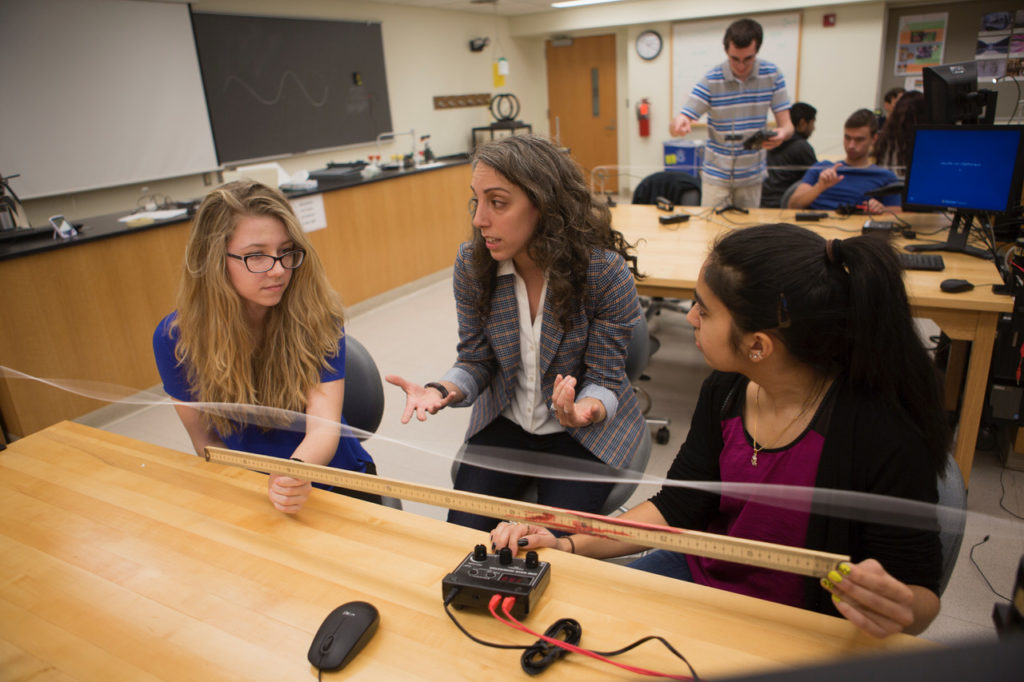TCNJ’s physics department was named one of only two institutions in the country to earn a 2019 Clare Boothe Luce Professorship grant from the Henry Luce Foundation.
This award will provide five years of funding for a new tenure-track woman faculty member in the physics department. A national search will take place during the 2020-2021 academic year, and the new professor will join TCNJ in August 2021.
The faculty member will serve as a role model, helping to further increase and retain TCNJ’s growing number of women physics majors.

“This award recognizes our physics department’s tremendous success in building a national program with a focus on inclusion and equity and also provides a significant investment that will help sustain and grow these important priorities,” says Jeffrey M. Osborn, Dean of TCNJ’s School of Science.
Nationally, women earn approximately 57 percent of U.S. bachelor’s degrees overall, but only 20 percent in physics. In 2016 only 26 percent of newly hired physics faculty across the U.S. were women. TCNJ’s physics department is working diligently to boost these numbers by strategically improving the enrollment, retention, and professional success of women and other traditionally underrepresented groups in the field.
Over the past three years the percentage of women undergraduate physics majors at TCNJ has increased significantly: for the 2019–2020 academic year, 36 percent of physics majors are women. TCNJ also was selected by the American Physical Society to host the 2019 Conference for Undergraduate Women in Physics for the Mid-Atlantic States, during which over 300 undergraduate physics majors and professionals attended the three-day conference at TCNJ.
“This professorship is an outstanding opportunity to accelerate our ongoing effort to attract and retain the next generation of women physicists,” says David McGee, chair of the physics department.
TCNJ’s physics department teaches over 3,400 students annually, nearly half of whom are women, and enrolls 85–100 undergraduate physics majors. The department has a track record of graduating up to 25 majors each year and earning national distinction as one of the top producers of physics majors in the U.S. The American Institute of Physics ranks TCNJ in the top two percent nationally for physics graduates among non-PhD granting institutions and the top eight percent among all institutions in the U.S.
“This award comes at a great time for the department, and it will be essential in helping us sustain our efforts to help women and other minority students succeed in physics,” says Angie M. Capece, assistant professor of physics.
About the Henry Luce Foundation
The mission of the Henry Luce Foundation is to enrich public discourse by promoting innovative scholarship, cultivating new leaders, and fostering international understanding. The Foundation advances its mission through grantmaking and leadership programs in the fields of Asia, higher education, religion and theology, art, and public policy.
About the Clare Boothe Luce Program
Since its first grants in 1989 the Clare Boothe Luce Program has become one of the single most significant sources of private support for women in science, mathematics and engineering in Higher Education in the United States. Clare Boothe Luce, the widow of Henry R. Luce, was a playwright, journalist, U.S. Ambassador to Italy, and the first woman elected to Congress from Connecticut. In her bequest establishing this program, she sought “to encourage women to enter, study, graduate, and teach” in science, mathematics and engineering.
The Clare Boothe Luce Program awards grants in three categories: Undergraduate Awards, Graduate Fellowships, and Professorships. To date, the program has supported more than 2,600 women. 2019 marks 30 years of Clare Boothe Luce Program grantmaking. In its 2019 award competition, the Clare Boothe Luce Program awarded a total of 11 new institutional grants: two grants were for professorships, six were for undergraduate research awards, and three were for undergraduate scholarships. By the end of 2019, the Program will have awarded grants totaling over $200 million in support.
— Luke Sacks
